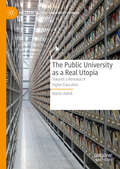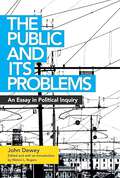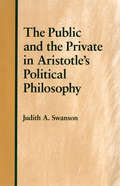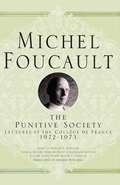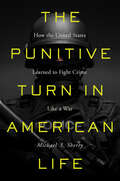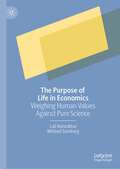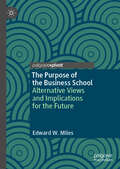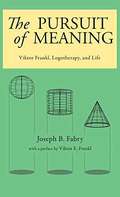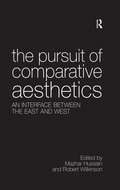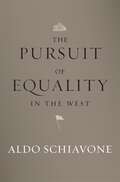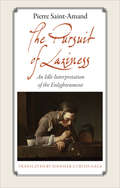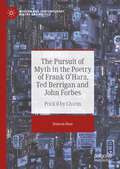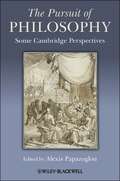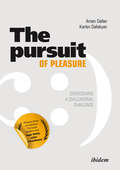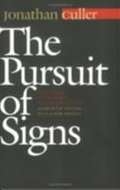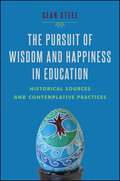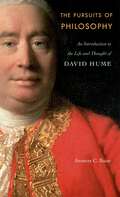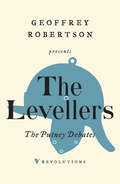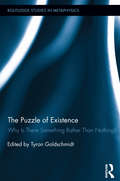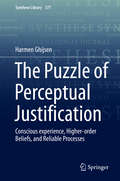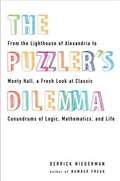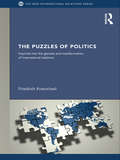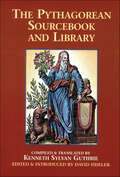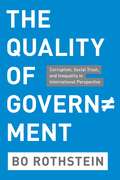- Table View
- List View
The Public University as a Real Utopia: Towards a Renewal of Higher Education (Palgrave Critical University Studies)
by Martin AidnikThis book theorises the public university as a real utopia, drawing upon the work of the American sociologist Erik Olin Wright. The book explores institutional democracy, academic freedom and the curriculum as the real utopian 'constituents' of the public university. In doing so, the author puts forward an argument for the redevelopment of public universities, seeking to do justice to both a radical vision and practical feasibility. This imaginative reconstruction of the university advances debate in the sociology and philosophy of higher education.
The Public and its Problems: An Essay in Political Inquiry
by John DeweyMore than six decades after John Dewey’s death, his political philosophy is undergoing a revival. With renewed interest in pragmatism and its implications for democracy in an age of mass communication, bureaucracy, and ever-increasing social complexities, Dewey’s The Public and Its Problems, first published in 1927, remains vital to any discussion of today’s political issues. This edition of The Public and Its Problems, meticulously annotated and interpreted with fresh insight by Melvin L. Rogers, radically updates the previous version published by Swallow Press. Rogers’s introduction locates Dewey’s work within its philosophical and historical context and explains its key ideas for a contemporary readership. Biographical information and a detailed bibliography round out this definitive edition, which will be essential to students and scholars both.
The Public and the Private in Aristotle's Political Philosophy
by Judith A. SwansonAristotle offers a conception of the private and its relationship to the public that suggests a remedy to the limitations of liberalism today, according to Judith A. Swanson. In this fresh and lucid interpretation of Aristotle's political philosophy, Swanson challenges the dominant view that he regards the private as a mere precondition to the public. She argues, rather, that for Aristotle private activity develops virtue and is thus essential both to individual freedom and happiness and to the well-being of the political order.Swanson presents an innovative reading of The Politics which revises our understanding of Aristotle's political economy and his views on women and the family, slavery, and the relation between friendship and civic solidarity. She examines the private activities Aristotle considers necessary to a complete human life—maintaining a household, transacting business, sustaining friendships, and philosophizing. Focusing on ways Aristotle's public invests in the private through law, rule, and education, she shows how the public can foster a morally and intellectually virtuous citizenry. In contrast to classical liberal theory, which presents privacy as a shield of rights protecting individuals from one another and from the state, for Aristotle a regime can attain self-sufficiency only by bringing about a dynamic equilibrium between the public and the private.The Public and the Private in Aristotle's Political Philosophy will be essential reading for scholars and students of political philosophy, political theory, classics, intellectual history, and the history of women.
The Punitive Society: Lectures at the Collège de France, 1972-1973 (Michel Foucault, Lectures at the Collège de France #2)
by Michel FoucaultThese thirteen lectures on the 'punitive society,' delivered at the Collège de France in the first three months of 1973, examine the way in which the relations between justice and truth that govern modern penal law were forged, and question what links them to the emergence of a new punitive regime that still dominates contemporary society.
The Punitive Turn in American Life: How the United States Learned to Fight Crime Like a War
by Michael S. SherryIn 1965, President Lyndon Johnson insisted that "the policeman is the frontline soldier in our war against crime," and police forces, arms makers, policy makers, and crime experts heeded this call to arms, bringing weapons and practices from the arena of war back home. The Punitive Turn in American Life offers a political and cultural history of the ways in which punishment and surveillance have moved to the center of American life and become imbued with militarized language and policies. Michael S. Sherry argues that, by the 1990s, the "war on crime" had been successfully broadcast to millions of Americans at an enormous cost--to those arrested, imprisoned, or killed and to the social fabric of the nation--and that the currents of vengeance that ran through the punitive turn, underwriting torture at home and abroad, found a new voice with the election of Donald J. Trump. By 2020, the connections between war-fighting and crime-fighting remained powerful, evident in campaigns against undocumented immigrants and the militarized police response to the nationwide uprisings after George Floyd's murder. Stoked by "forever war," the punitive turn endured even as it met fiercer resistance. From the racist system of mass incarceration and the militarization of criminal justice to gated communities, public schools patrolled by police, and armies of private security, Sherry chronicles the United States' slide into becoming a meaner, punishment-obsessed nation.
The Purpose of Life in Economics: Weighing Human Values Against Pure Science
by Michael Szenberg Lall RamrattanThis book is a compilation of economic views on the purpose of life. It follows a unique approach, starting with propositions from diverse fields that act as governing laws of the purpose of life in economics, then guiding the reader through the physical, philosophical, and psychological views of the purpose of life, as economics and economic theories can find their roots in all these areas. The book concludes with the purpose of life presented through economic doctrines (from the pre-classical, to classical, to neo-classical schools of economic thought), through the lens of economic development, and from the perspective of several religious doctrines.
The Purpose of the Business School: Alternative Views and Implications for the Future
by Edward W. MilesIn the mid-20th century, university-based business schools re-oriented themselves to increased alignment with the preferences of the university and decreased alignment with the preferences of business. This re-alignment has caused multiple observers to question the effectiveness of current-day business schools. For example, recent discussions have lamented that business schools are engaged in research that does not influence the practice of business. This book engages these debates, arguing that all judgments about the effectiveness of business schools are rooted in assumptions about what the purposes of the business school appropriately are and that many of those assumptions are unstated and not subjected to debate. The author weaves a unique blend of complexity theory, philosophy of science, and the nature of professions to articulate those goals and assess the effectiveness at meeting them. The book traces parallel discussions regarding the purpose of the university in the writings of Aristotle and Wilhelm von Humboldt and ties those discussions to current debates. This book will inform business faculty and administrators of the degree to which university-based business schools are balancing multiple purposes which include discovery of knowledge, creating knowledge that informs the practice of business, training professionals, and instilling ethical principles in its training of those professionals.
The Pursuit Of Meaning: Viktor Frankl, Logotherapy, And Life
by Viktor E. Frankl Joseph B. FabryContains the essence of the logotherapeutic writings of Viktor Frankl, who noted that many readers report that they understand some parts of logotherapy for the first time after reading this book. Fabry wrote in the introduction: Many older therapies place responsibility for our difficulties on our early upbringing. Logotherapy is "education to responsibility." Outside influences are important but not all-determining. Within limitations we have a say about who we are and who we want to become. We need never let ourselves be reduced to helpless victims. Consequently, logotherapy-unlike therapies that aim at equilibrium by adjusting patients to society-does not see a tensionless life as a therapeutic goal. Tension is part of living as a human being in a human society. To remain healthy, the unhealthy tensions of body and psyche are to be avoided. But the healthy tension of the spirit strengthens our spiritual muscles. The healthiest tension is between what we are and what we have the vision of growing toward, or, to use Frankl's favorite phrase, "the tension between being and meaning" (Psychotherapy and Existentialism, p. 10). The struggle for meaning is not easy. Life does not owe us pleasure; it does offer us meaning. Mental health does not come to those who demand happiness but to those who find meanings; to them happiness comes as a side product. "It must ensue" noted Frankl. "It cannot be pursued" (Unconscious God, p. 85). Logotherapy maintains and restores mental health by providing a sound view of the human being and the world as we know it. It draws on the huge reservoir of health stored in our specifically human dimension-our creativity, our capacity to love, our reaching out to others, our desire to be useful, our ability to orient to goals, and our will to meaning. Logophilosophy emphasizes what is right with us, what we like about ourselves, our accomplishments, and our peak experiences. It also considers the qualities we dislike so we may change them, our failures so we can learn from them, our abysses so we may lift ourselves up, knowing that peaks exist and can be reached.
The Pursuit of Comparative Aesthetics: An Interface Between the East and West
by Mazhar HussainComparative aesthetics is the branch of philosophy which compares the aesthetic concepts and practices of different cultures. The way in which cultures conceive of the aesthetic dimension of life in general and art in particular is revelatory of profound attitudes and beliefs which themselves make up an important part of the culture in question. This anthology of essays by internationally recognised scholars in this field brings into one volume some of the most important research in comparative aesthetics, from classic early essays to previously unpublished contemporary pieces. Ranging across cultures and time periods as diverse as ancient Greece, India and China and the modern West and Japan, the essays reveal both similarities and deep differences between the aesthetic traditions concerned. In the course of these expositions and comparisons there emerges the general conclusion that no culture can be fully grasped if its aesthetic ideas are not understood.
The Pursuit of Equality in the West
by Aldo SchiavoneOne of the world’s foremost historians of Western political and legal thought proposes a bold new model for thinking about equality at a time when its absence threatens democracies everywhere.How much equality does democracy need to survive? Political thinkers have wrestled with that question for millennia. Aristotle argued that some are born to command and others to obey. Antiphon believed that men, at least, were born equal. Later the Romans upended the debate by asking whether citizens were equals not in ruling but in standing before the law. Aldo Schiavone guides us through these and other historical thickets, from the first democracy to the present day, seeking solutions to the enduring tension between democracy and inequality.Turning from Antiquity to the modern world, Schiavone shows how the American and the French revolutions attempted to settle old debates, introducing a new way of thinking about equality. Both the French revolutionaries and the American colonists sought democracy and equality together, but the European tradition (British Labour, Russian and Eastern European Marxists, and Northern European social democrats) saw formal equality—equality before the law—as a means of obtaining economic equality. The American model, in contrast, adopted formal equality while setting aside the goal of economic equality.The Pursuit of Equality in the West argues that the United States and European models were compatible with industrial-age democracy, but neither suffices in the face of today’s technological revolution. Opposing both atomization and the obsolete myths of the collective, Schiavone thinks equality anew, proposing a model founded on neither individualism nor the erasure of the individual but rather on the universality of the impersonal human, which coexists with the sea of differences that makes each of us unique.
The Pursuit of Laziness
by Pierre Saint-Amand Jennifer Curtiss GageWe think of the Enlightenment as an era dominated by ideas of progress, production, and industry--not an era that favored the lax and indolent individual. But was the Enlightenment only about the unceasing improvement of self and society? The Pursuit of Laziness examines moral, political, and economic treatises of the period, and reveals that crucial eighteenth-century texts did find value in idleness and nonproductivity. Fleshing out Enlightenment thinking in the works of Denis Diderot, Joseph Joubert, Pierre de Marivaux, Jean-Jacques Rousseau, and Jean-Siméon Chardin, this book explores idleness in all its guises, and illustrates that laziness existed, not as a vice of the wretched, but as an exemplar of modernity and a resistance to beliefs about virtue and utility.Whether in the dawdlings of Marivaux's journalist who delayed and procrastinated or in the subjects of Chardin's paintings who delighted in suspended, playful time, Pierre Saint-Amand shows how eighteenth-century works provided a strong argument for laziness. Rousseau abandoned his previous defense of labor to pursue reverie and botanical walks, Diderot emphasized a parasitic strategy of resisting work in order to liberate time, and Joubert's little-known posthumous Notebooks radically opposed the central philosophy of the Enlightenment in a quest to infinitely postpone work.Unsettling the stubborn view of the eighteenth century as an age of frenetic industriousness and labor, The Pursuit of Laziness plumbs the texts and images of the time and uncovers deliberate yearnings for slowness and recreation.
The Pursuit of Myth in the Poetry of Frank O'Hara, Ted Berrigan and John Forbes: Prick'd by Charm (Modern and Contemporary Poetry and Poetics)
by Duncan HoseThe Pursuit of Myth in the Poetry of Frank O'Hara, Ted Berrigan and John Forbes traces a tradition of revolutionary self-mythologising in the lives and works of Frank O’Hara, Ted Berrigan and John Forbes, as a significant trefoil in twentieth-century English language poetry. All three had untimely deaths, excited a collective homage, and developed cult followings that reverberate today. This book tracks the transmission of the poem as charm, the poet as charmer, and the reinstitution of troubadour erotics as a kind of social poetics. Starting with Orpheus, the book refreshes the myth of the poet as mythmaker, examining how myths of “self” and “nation” are regenerated for the twenty-first century and how persons-as-myths are made in community through coteries of artists and beyond. Duncan Bruce Hose’s critical vocabulary, with its nucleus of mythos, searches the edges of phenomenal enquiry, closing in on the work of “glamour”, “aura”, “charm”, “possession”, “phantasm”, the “daemonic”, and the logic of haunting in the continuing being of these three poets as “charismatic animals”.
The Pursuit of Philosophy: Some Cambridge Perspectives (Metaphilosophy)
by Alexis PapazoglouEleven Cambridge academics approach philosophy from various fields, to broaden its practical and theoretical applications. Guides a tour through various academic departments—including history, political science, classics, law, and English—to ferret out the philosophy in their syllabi, and to show philosophy’s symbiotic relationship with other fields Provides a map of what philosophy is considered to be at Cambridge in the early twenty-first century, about a hundred years after the “founding fathers” of analytic philosophy reigned at Cambridge Offers useful new directions for the study and application of philosophy, and how other fields can influence them
The Pursuit of Pleasure: Overcoming a Civilizational Challenge
by Arsen Dallan Karlen DallakyanThis important book unveils how the pleasure principle has taken humanity hostage to the powers of branding and consumerism, steering our most basic desires. Radically re-evaluating the notion of pleasure and arguing for a deep societal change, it shows the way to a new humanist culture.
The Pursuit of Signs: Semiotics, Literature, Deconstruction
by Jonathan CullerThe primary task of literary theory, Jonathan Culler asserts in the new edition of his classic in this field, is not to illuminate individual literary works but to explain the system of literary signification-the rules and conventions that determine a reader's understanding of a text and that make literary communication possible. In this wide-ranging book, he investigates the possibilities of a semiotics of literature. A new preface places The Pursuit of Signs in the context of major developments in the study of literature since publication of the original Cornell edition in 1981.
The Pursuit of Wisdom and Happiness in Education: Historical Sources and Contemplative Practices
by Sean SteelModern scholarship has struggled to come to terms with the meaning of wisdom and its significance in the field of education. This book examines the importance of pursuing wisdom in schools by turning to ancient and medieval sources for clarification concerning the nature of wisdom. Sean Steel argues that our current emphasis on the development of rigorous critical-analytic thinking skills, on assessment, and on accountability in education has negatively impacted the ability of schools to foster an environment in which both students and teachers might pursue wisdom. Although in recent times efforts have been made to incorporate the pursuit of wisdom into schools through Philosophy for Children (P4C) and contemplative education programming, such initiatives have missed their mark. Steel therefore recommends not more accountability in education for the purpose of ensuring global competitiveness, but rather the institutional promotion of periods of leisure or schole in the school day.Drawing upon his own experiences as a teacher who has tried to encourage students to search for wisdom, the author discusses some of the challenges and pitfalls of wisdom seeking. He also offers examples of various wisdom-seeking activities that might bear fruit in the classroom.
The Pursuits of Philosophy: An Introduction to the Life and Thought of David Hume
by Annette C. BaierMarking the tercentenary of David Hume's birth, Annette Baier has created an engaging guide to the philosophy of one of the greatest thinkers of Enlightenment Britain. Drawing deeply on a lifetime of scholarship and incisive commentary, she deftly weaves Hume’s autobiography together with his writings and correspondence, finding in these personal experiences new ways to illuminate his ideas about religion, human nature, and the social order.Excerpts from Hume’s autobiography at the beginning of each chapter open a window onto the eighteenth-century context in which Hume’s philosophy developed. Famous in Christian Britain as a polymath and a nonbeliever, Hume recounts how his early encounters with clerical authority laid the foundation for his lifelong skepticism toward religion. In Scotland, where he grew up, he had been forced to study lists of sins in order to spot his own childish flaws, he reports. Later, as a young man, he witnessed the clergy’s punishment of a pregnant unmarried servant, and this led him to question the violent consequences of the Church’s emphasis on the doctrine of original sin. Baier’s clear interpretation of Hume’s Treatise of Human Nature explains the link between Hume’s growing disillusionment and his belief that ethics should be based on investigations of human nature, not on religious dogma.Four months before he died, Hume concluded his autobiography with a eulogy he wrote for his own funeral. It makes no mention of his flaws, critics, or disappointments. Baier’s more realistic account rivets our attention on connections between the way Hume lived and the way he thought—insights unavailable to Hume himself, perhaps, despite his lifelong introspection.
The Putney Debates: The Putney Debates (Revolutions Ser.)
by Philip Baker Geoffrey Robertson The LevellersIn a series of debates with Oliver Cromwell in Civil War England of 1647, the Levellers argued for democracy for the first time in British history.Evolving from Oliver Cromwell’s New Model army in Parliament’s struggle against King Charles I, the Levellers pushed for the removal of corruption in parliament, universal voting rights and religious toleration. This came to a head with the famous debates between the Levellers and Cromwell at St Mary’s church in Putney, London. Renowned human-rights lawyer and author Geoffrey Robertson argues for the relevance of the Levellers’ stand today, showing how they were the first Western radical democrats.
The Puzzle of Existence: Why Is There Something Rather Than Nothing? (Routledge Studies in Metaphysics #6)
by Tyron GoldschmidtThis groundbreaking volume investigates the most fundamental question of all: Why is there something rather than nothing? The question is explored from diverse and radical perspectives: religious, naturalistic, platonistic and skeptical. Does science answer the question? Or does theology? Does everything need an explanation? Or can there be brute, inexplicable facts? Could there have been nothing whatsoever? Or is there any being that could not have failed to exist? Is the question meaningful after all? The volume advances cutting-edge debates in metaphysics, philosophy of cosmology and philosophy of religion, and will intrigue and challenge readers interested in any of these subjects.
The Puzzle of Perceptual Justification
by Harmen GhijsenThis book provides an accessible and up-to-date discussion of contemporary theories of perceptual justification that each highlight different factors related to perception, i. e. , conscious experience, higher-order beliefs, and reliable processes. The book's discussion starts from the viewpoint that perception is not only one of our fundamental sources of knowledge and justification, but also plays this role for many less sophisticated animals. It proposes a scientifically informed reliabilist theory which can accommodate this fact without denying that some of our epistemic abilities as human perceivers are special. This allows it to combine many of our intuitions about the importance of conscious experience and higher-order belief with the controversial thesis that perceptual justification is fundamentally non-evidential in character.
The Puzzle of Perceptual Justification: Conscious experience, Higher-order Beliefs, and Reliable Processes (Synthese Library #377)
by Harmen GhijsenThis book provides an accessible and up-to-date discussion of contemporary theories of perceptual justification that each highlight different factors related to perception, i.e., conscious experience, higher-order beliefs, and reliable processes. The book’s discussion starts from the viewpoint that perception is not only one of our fundamental sources of knowledge and justification, but also plays this role for many less sophisticated animals. It proposes a scientifically informed reliabilist theory which can accommodate this fact without denying that some of our epistemic abilities as human perceivers are special. This allows it to combine many of our intuitions about the importance of conscious experience and higher-order belief with the controversial thesis that perceptual justification is fundamentally non-evidential in character.
The Puzzler's Dilemma: From the Lighthouse of Alexandria to Monty Hall, a Fresh Look at Classic Conundrums of Logic, Mathematics, and Life
by Derrick NiedermanCalling all puzzlers. . . From mathematics to word puzzles, from logic to lateral thinking, veteran puzzle maker Derrick Niederman delights in tackling the trickiest brainteasers in a new way. Among the old chestnuts he cracks wide open are the following classics: Knights and knaves The monk and the mountain The dominoes and the chessboard The unexpected hanging The Tower of Hanoi Using real-world analogies, infectious humor, and a fresh approach, this deceptively simple volume will challenge, amuse, enlighten, and surprise even the most experienced puzzle solver.
The Puzzles of Politics: Inquiries into the Genesis and Transformation of International Relations (New International Relations)
by Friedrich KratochwilFriedrich Kratochwil is the author of the classic book: Rules, Norms and Decisions (1989), which introduced constructivism to international relations and has had a profound and significant impact on the discipline. The Puzzle of Politics brings together for the first time a collection of his key essays to explain his approach to international relations and how his thinking has developed over the last 30 years. It addresses topical themes and issues central to his work including sovereignty, law, epistemology, boundaries, global governance and world society. The book includes a framing introduction written for this volume in which Kratochwil provides an intellectual biography providing context as well as an introduction to his work. This important volume will be of very strong interest to students and scholars of international relation, political theory and law. Friedrich Kratochwil is presently Professor of International Relations at the European University Institute in Florence, Italy, and visiting scholar at Kyung Hee University, Seoul, Korea. After receiving his Ph.D. from Princeton he taught at the in the US at Maryland, Columbia and Penn, before returning to the LMU in Munich, Germany. He has been the editor of the European Journal of International Relations and member of the editorial boards of several journals, including the Journal of International Relations of the Asia-Pacific, International Studies Quarterly, International Organization, World Politics, Review of International Studies, and the Journal of International Relations and Development.
The Pythagorean Sourcebook and Library: An Anthology of Ancient Writings Which Relate to Pythagoras and Pythagorean Philosophy
by Kenneth Sylvan Guthrie and David R. FidelerThis anthology, the largest collection of Pythagorean writings ever to appear in English, contains the four ancient biographies of Pythagoras and over 25 Pythagorean and Neopythagorean writings from the Classical and Hellenistic periods. The material of this book is indispensable for anyone who wishes to understand the real spiritual roots of Western civilization.
The Quality of Government: Corruption, Social Trust, and Inequality in International Perspective
by Bo RothsteinThe relationship between government, virtue, and wealth has held a special fascination since Aristotle, and the importance of each frames policy debates today in both developed and developing countries. While it's clear that low-quality government institutions have tremendous negative effects on the health and wealth of societies, the criteria for good governance remain far from clear. In this pathbreaking book, leading political scientist Bo Rothstein provides a theoretical foundation for empirical analysis on the connection between the quality of government and important economic, political, and social outcomes. Focusing on the effects of government policies, he argues that unpredictable actions constitute a severe impediment to economic growth and development--and that a basic characteristic of quality government is impartiality in the exercise of power. This is borne out by cross-sectional analyses, experimental studies, and in-depth historical investigations. Timely and topical, The Quality of Government tackles such issues as political legitimacy, social capital, and corruption.
